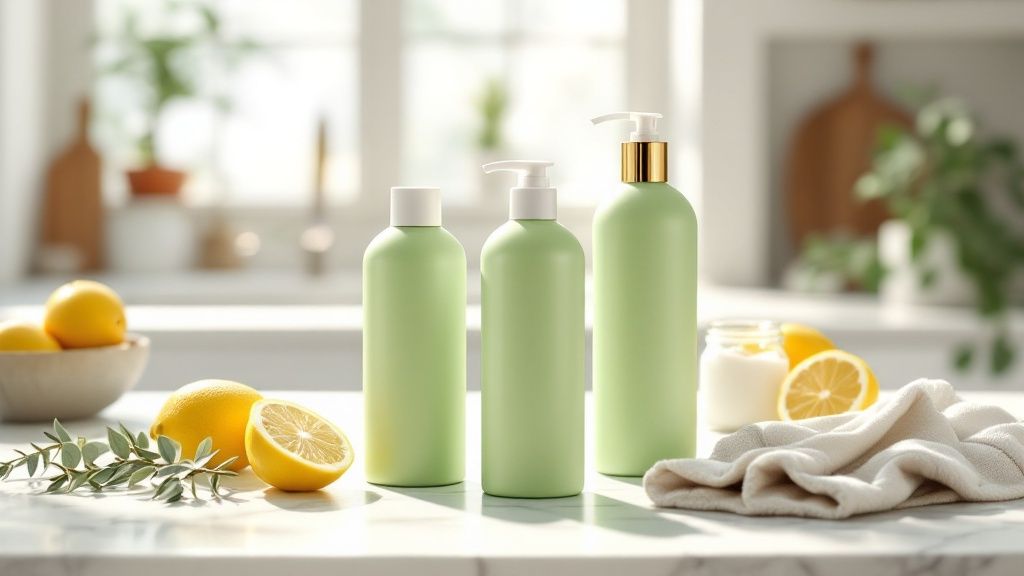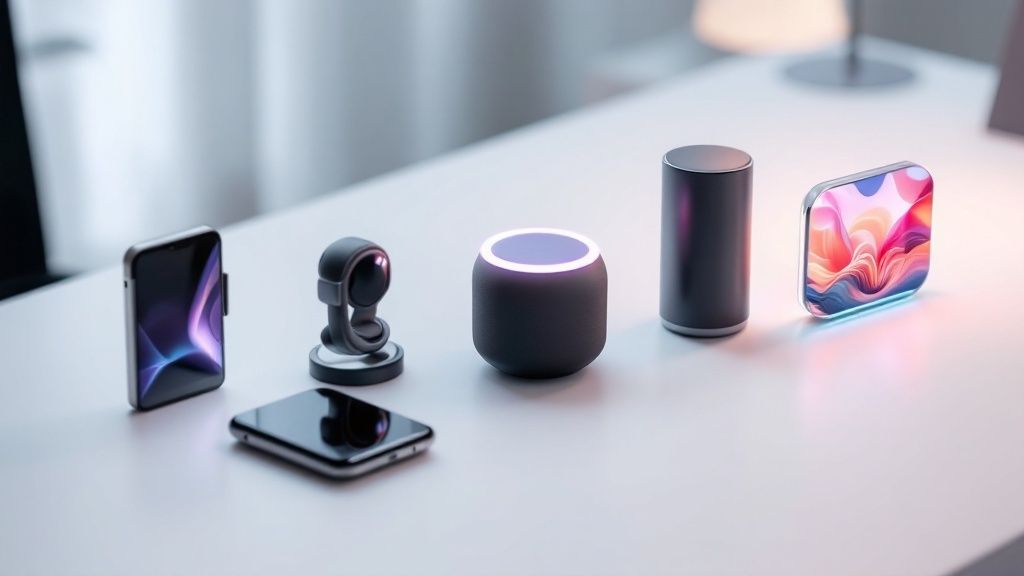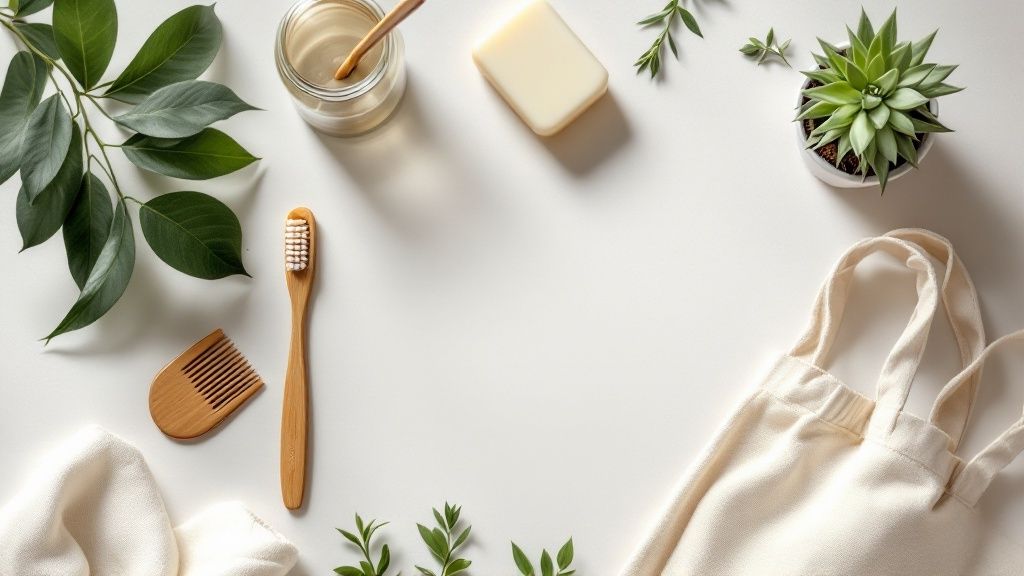
Your Guide to the Best Eco Friendly Products
Hello and welcome! Making choices that are kinder to our planet feels wonderful, and we're so glad you're here to explore the best eco friendly products with us. This is all about making small, meaningful swaps that feel right for you, one step at a time.
Embracing a greener lifestyle is a beautiful journey, not a race. It’s about choosing quality items you feel good about, creating less waste, and contributing to a healthier world with every thoughtful purchase.
Embracing a Greener Lifestyle With Eco Friendly Products
Stepping into a more sustainable lifestyle can feel like a huge undertaking, but it’s really just a series of small, thoughtful choices that add up. It’s about picking products that you feel good about and that contribute to a healthier world, one swap at a time. This journey is easier than you think, and incredibly rewarding.
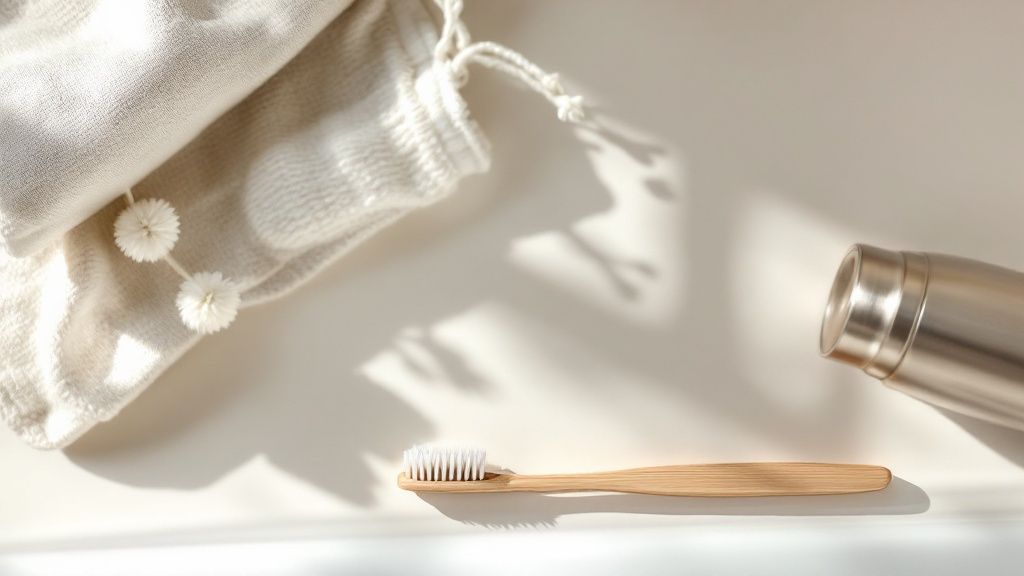
And you’re definitely not alone. There's a growing global movement of people just like you who want their choices to count for something more. This shift in thinking is showing up in a big way—the sustainable products market is expected to rocket from USD 382.6 billion in 2025 to over USD 802.6 billion by 2035. That kind of growth sends a powerful message. If you’re curious, you can discover more insights about this sustainable market trend.
Your Partner in Sustainable Living
Here at Wonders Emporium Shop, we're passionate about making this transition as smooth and enjoyable as possible. We are dedicated to finding high-quality, unique, and genuinely effective eco-friendly products that easily fit into your daily life. Think of us as your trusted partner, curating selections you can count on with care.
This guide is here to give you the confidence to make smart choices. We’ll cover everything from what "eco-friendly" really means to how to spot authentic brands and avoid empty promises. Our goal is to take the mystery out of sustainability and show you practical ways to bring it into your home.
Think of it this way: every time you choose a reusable coffee cup or a biodegradable cleaning cloth, you're casting a vote for a healthier planet. These small actions create a powerful ripple effect.
As you dive into this guide, know that our shop—proudly Owned & Operated by Boricua Innovations LLC—is built on a foundation of quality, customer care, and Puerto Rican pride. We are here to support you every step of the way on your journey to a greener, more mindful lifestyle. Let’s get started!
What Truly Makes a Product Eco-Friendly?
Have you ever stood in an aisle, looking at a product labeled "green" or "earth-friendly," and wondered what that really means? It’s a common feeling. Let's cut through the buzzwords and look at the entire story of a product to understand its true environmental impact.
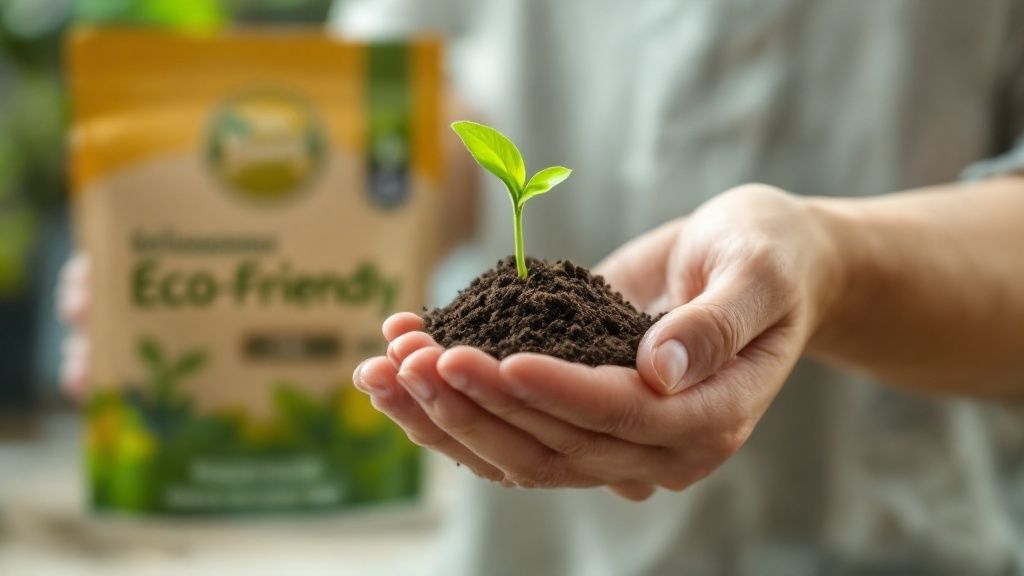
Think of a product's life as a journey with three main stages: its beginning (creation), its middle (its useful life), and its end (disposal). A genuinely eco-friendly item is one that minimizes harm at every single step, not just one. It’s a complete picture.
The Full Life Cycle of a Product
Looking at the entire life cycle helps us move beyond simple marketing claims. It empowers us to ask the right questions and spot the best eco-friendly products that actually line up with our values. Let’s break down what to look for at each stage of this journey.
Step 1: From Raw Materials to Creation
This is where the story begins. A product's environmental footprint starts with what it's made from and how it's manufactured.
- Sustainably Sourced Materials: Are the raw materials renewable, like bamboo or cork? Or are they made from recycled content, giving old materials a new purpose? This is a huge factor.
- Ethical Production: How was the product made? Ethical production means fair labor practices and safe working conditions. It also means using manufacturing processes that may support water and energy conservation, cutting down on pollution.
- Minimalist Packaging: Is the product wrapped in layers of plastic, or does it come in recycled, recyclable, or even compostable packaging? Less is almost always better.
Step 2: During Its Useful Life
Next, consider how the product holds up while you're actually using it. A sustainable product should be designed for the long haul, not for a quick trip to the landfill.
An item's true value isn't just in what it does, but in its durability and reusability. A well-made product that lasts for years has a much smaller environmental cost than a disposable one you replace every few weeks.
Key questions to ask include:
- Does it help you reduce waste? For example, reusable food wraps replace single-use plastic wrap.
- Is it energy-efficient? Appliances that use less electricity help lower your carbon footprint every day.
- Is it durable and long-lasting? High-quality construction means you buy less over time.
Step 3: After Its Use
Finally, what happens when you're done with the product? This "end-of-life" stage is a critical piece of the puzzle.
- Biodegradable: Can the product break down naturally and return to the earth without leaving harmful stuff behind? Think of compostable kitchen sponges or bamboo toothbrushes.
- Recyclable: Can the materials be collected and remade into something new? Glass, metal, and certain plastics often fall into this category.
- Upcyclable: Can the item be creatively repurposed for a new function, extending its life even further?
Looking for Proof Beyond the Label
With so many brands making green claims, how do you know who to trust? This is where trustworthy certifications come in. These third-party seals of approval confirm that a product meets specific, tough standards for sustainability and ethics.
Look for logos from reputable organizations. For instance, you can explore examples like GOTS-certified organic tampons to see what a specific certification looks like. These seals give you confidence that you're choosing something genuinely sustainable.
At Wonders Emporium Shop, we prioritize transparency and seek out products that meet these high standards. By understanding a product's full life cycle, you can make choices that truly matter.
Discovering the Best Eco Friendly Product Categories
Ready to figure out where your choices can make the biggest difference? Stepping into the world of sustainability feels a lot less overwhelming when you know exactly where to look. Let's explore the areas in your daily life where one simple swap can start a positive ripple effect.
We’re going to focus on three key categories: Home & Kitchen, Personal Care, and Daily Essentials. These are the places often packed with single-use plastics and wasteful habits, which actually makes them the perfect spots to start making thoughtful, eco-friendly changes.
Simple Eco Friendly Swaps for Your Daily Routine
Making a change doesn't have to be a massive overhaul. Often, the most impactful shifts are the small, consistent ones we make every day. The table below shows just how easy it is to trade a common disposable item for a durable, sustainable alternative.
| Conventional Product | Eco Friendly Alternative | Key Benefit |
|---|---|---|
| Plastic Wrap | Beeswax Food Wraps | Reduces plastic waste and keeps food fresh naturally. |
| Disposable Sponges | Biodegradable Scrubbers | Compostable and may help avoid microplastic pollution. |
| Liquid Shampoo Bottle | Solid Shampoo Bar | Eliminates plastic packaging; one bar can replace 2-3 bottles. |
| Plastic Toothbrush | Bamboo Toothbrush | Biodegradable handle helps reduce landfill waste. |
| Single-Use Coffee Cup | Reusable Travel Mug | Prevents paper and plastic cup waste; keeps drinks hot longer. |
| Plastic Shopping Bags | Reusable Tote Bags | Cuts down on plastic pollution and saves resources. |
Each of these swaps is a step in the right direction, proving that a sustainable lifestyle is built on simple, repeatable actions.
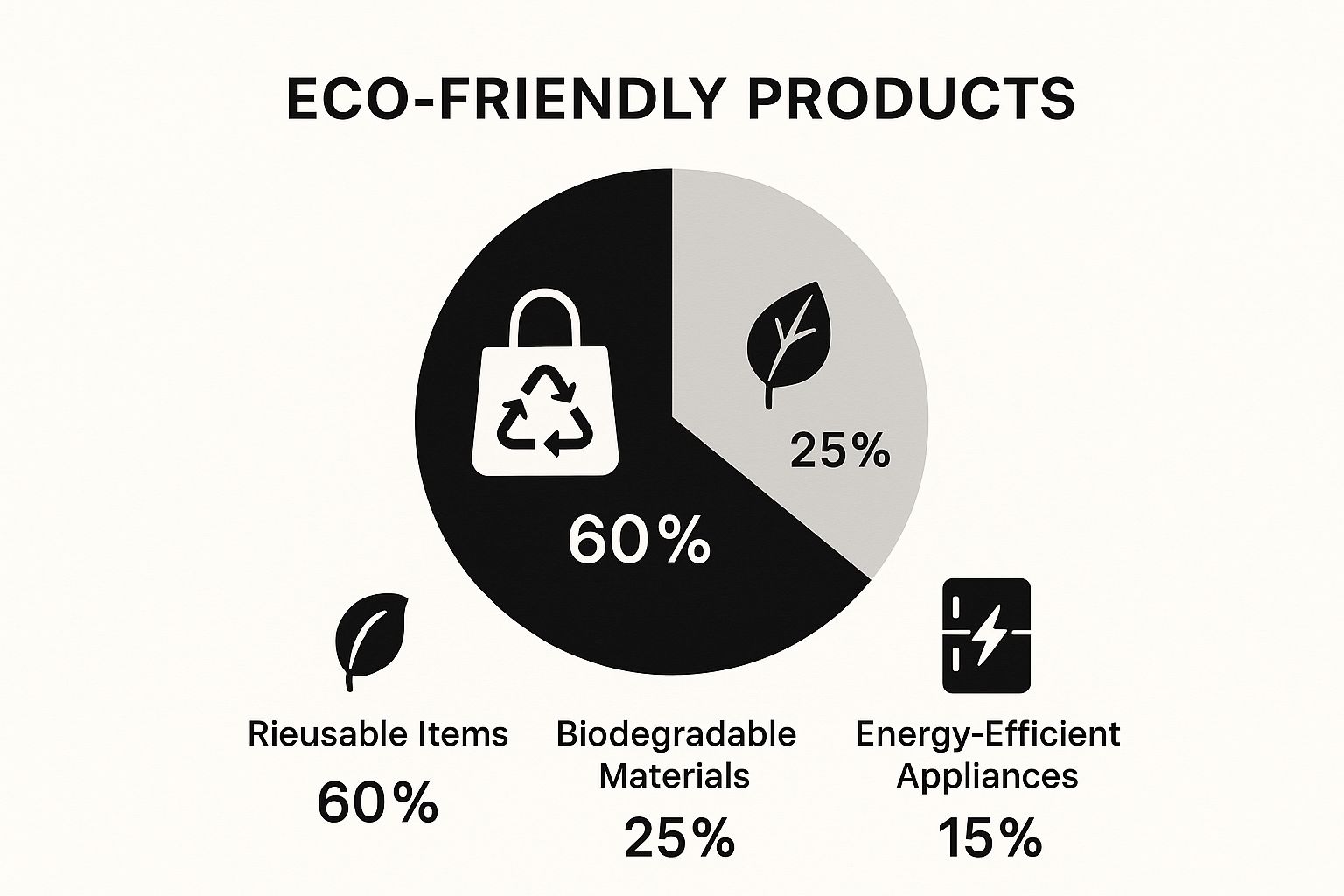
Your Home and Kitchen Sanctuary
The heart of the home is the best place to kick off your eco-friendly journey. Just think about your daily kitchen routine—storing leftovers, wiping up spills, washing dishes. It's an area where single-use plastics and paper products tend to take over, but it doesn’t have to stay that way.
Imagine swapping that endless roll of plastic wrap for a set of beautiful, reusable beeswax food wraps. They don't just keep your food fresh; they add a touch of natural charm to your fridge. This one small change can stop a shocking amount of plastic from ever reaching a landfill.
Here are a few other easy swaps for a greener kitchen:
- Plastic Food Containers to Glass or Stainless Steel: These materials are tough, non-toxic, and can be recycled forever. They also won't absorb weird smells or stains like plastic does.
- Paper Towels to Reusable Cloths: A good set of absorbent, washable cloths can easily replace hundreds of paper towel rolls, saving trees and cutting down on waste.
- Disposable Sponges to Biodegradable Scrubbers: Your typical kitchen sponge is made of plastic and becomes a breeding ground for bacteria. Alternatives made from coconut fiber or loofah work just as well and can be composted when you're done.
A sustainable kitchen is also about rethinking how you clean. Many conventional cleaning products are full of harsh chemicals and sold in disposable plastic bottles. If you need some guidance, check out our guide on the best eco-friendly cleaning products for a healthier home.
A Fresh Take on Personal Care
Let's be honest, the personal care industry has been a huge source of plastic waste, with countless bottles, tubes, and containers tossed out every single day. But a major shift is happening. More and more people are demanding sustainable options that are better for their bodies and the planet.
This isn't just a fleeting trend. The global sustainable personal care market was valued at USD 54.36 billion in 2024 and is expected to hit USD 90.40 billion by 2032. That kind of growth shows a real, deep-seated desire for natural, ethically-made products.
Swapping to solid, package-free alternatives isn't just about reducing plastic. It’s about simplifying your routine with high-quality, concentrated ingredients that are better for you and the environment.
Here’s how you can easily transform your personal care routine:
- Liquid Shampoo to Solid Shampoo Bars: One little shampoo bar can replace up to three plastic bottles. They’re amazing for travel and are packed with natural ingredients your hair will love.
- Plastic Toothbrushes to Bamboo Toothbrushes: Billions of plastic toothbrushes are thrown away every year. A bamboo toothbrush is a simple, effective swap with a handle that can biodegrade.
- Disposable Cotton Rounds to Reusable Facial Pads: Soft, washable pads made from bamboo or organic cotton are perfect for taking off makeup or applying toner. You'll save money and cut down on daily waste.
Daily Essentials for On-the-Go Living
Finally, let’s talk about the items we use when we’re out and about. Our daily habits, like grabbing a coffee or doing a quick grocery run, often involve single-use items just for convenience. But with a little bit of prep, you can make a huge difference.
Carrying a few key reusables with you can slash your daily waste. Think of it as your personal eco-toolkit that you can rely on wherever you go. This is where Wonders Emporium Shop really shines, offering unique and durable essentials for your sustainable lifestyle.
Here are some must-have products for living sustainably on the move:
- Disposable Shopping Bags to Reusable Tote Bags: A sturdy, stylish tote is essential. Keep a few in your car or by the door so you never have to take a plastic bag again.
- Single-Use Coffee Cups to a Reusable Travel Mug: Many coffee shops will even give you a discount for bringing your own cup! Plus, it keeps your drink warm for way longer.
- Plastic Water Bottles to a Stainless Steel or Glass Bottle: Staying hydrated is key, but disposable plastic bottles are a massive source of pollution. A reusable bottle is a much healthier and more sustainable choice.
How to Spot Greenwashing and Choose Authentic Brands
In a world filled with "green" and "eco" claims, how can you tell which products are genuinely sustainable and which are just cleverly marketed? Learning to spot the difference is easier than you might think. Let's break down what "greenwashing" is and give you the tools to choose brands that truly align with your values.
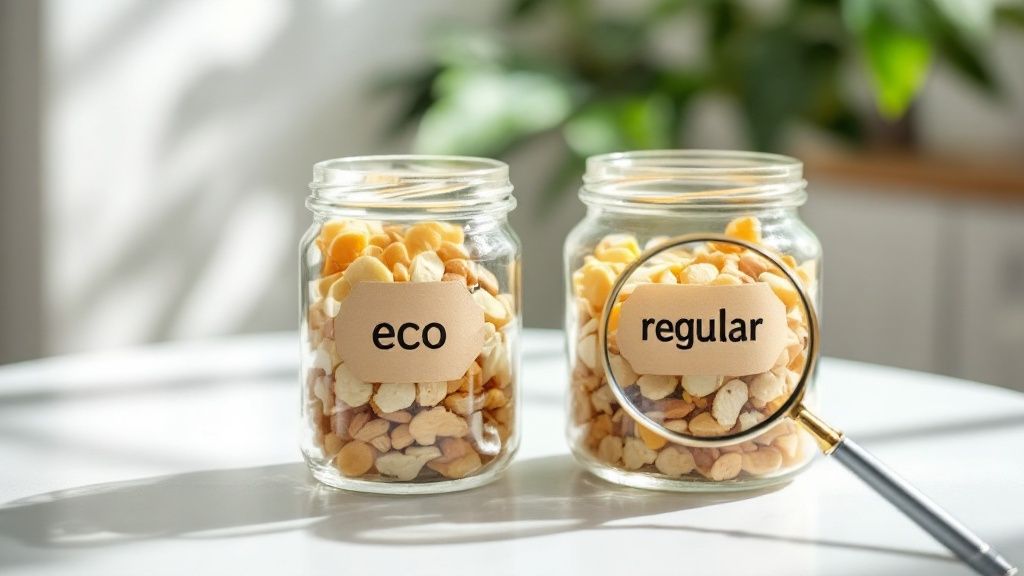
Greenwashing is what happens when a company pours more time and money into looking environmentally friendly than it does into being environmentally friendly. They use vague, feel-good terms to trick you into thinking a product is more sustainable than it really is.
Your Greenwashing Detection Kit
Becoming a savvy shopper means learning to look past the pretty packaging and surface-level claims. It’s all about knowing which questions to ask. Here’s a simple checklist to help you vet brands and their products with confidence.
-
Vague Language: Watch out for fuzzy terms like "eco-friendly," "all-natural," or "green" without anything to back them up. Real-deal brands will tell you why their product is sustainable—for instance, "made from 100% recycled plastic" or "packaged in compostable materials."
-
Irrelevant Claims: Sometimes, a brand will shout about one tiny green feature to distract you from its other, not-so-great practices. A product might be labeled "CFC-free," which sounds great, but CFCs have been banned for decades. It's not a special feature; it's just the law.
-
Hidden Trade-Offs: This is a classic move where a brand promotes a product as "green" based on a single environmental issue while conveniently ignoring others. For example, a table made from sustainably harvested wood is a good start, but not if it was built in a factory that pollutes local rivers.
-
Lack of Proof: If a company makes a bold claim, it should be able to prove it. Can you easily find information on their website about their supply chain, manufacturing process, or labor standards? Transparency is a huge green flag for an authentic brand.
The Power of Third-Party Certifications
One of the most reliable ways to cut through the marketing noise is to look for third-party certifications. These are official logos from independent organizations that have already verified a product or company meets specific, tough standards. Basically, they do the heavy lifting for you.
Think of these certifications as a stamp of approval from a trusted expert. When you see a legitimate seal, you can feel confident that the product has been thoroughly vetted and meets a high bar for sustainability and ethics.
Some of the most respected certifications to look for include:
- Fair Trade Certified: This may indicate that producers in developing countries receive fair wages and work in safer conditions.
- Leaping Bunny: Shows that no animal testing was used in any phase of product development.
- B Corp Certification: Verifies that a company meets high standards of social and environmental performance, accountability, and transparency.
- USDA Organic: Certifies that agricultural products are grown and processed according to strict federal guidelines covering everything from soil quality to pest control.
At Wonders Emporium Shop, we believe in total transparency and partner only with brands that share our commitment to quality and ethical practices. We know that building trust is everything, and we strive to give you all the information you need to make choices you can feel good about. Our shop, Owned & Operated by Boricua Innovations LLC, is built on a foundation of care—and that absolutely includes caring for our planet.
Ready to explore products from brands you can trust? Browse our curated collections of the best eco friendly products and start your sustainable journey with confidence.
The Innovative Materials Behind Sustainable Products
Ever wonder what gives the best eco-friendly products their planet-friendly power? It all comes down to the incredible, forward-thinking materials they're made from. We're moving beyond traditional, resource-intensive options and embracing materials that are renewable, recycled, or biodegradable. Let's explore the stories behind some of these materials that are changing the way we live.
This shift isn't just a niche trend; it's a massive global movement. The sustainable materials market—the engine powering these products—was valued at USD 333.31 billion in 2024 and is projected to soar to over USD 1,073.73 billion by 2034. This explosive growth is driven by a collective desire for better, more responsible choices.
The Power of Plants: Bamboo and Organic Cotton
Two of the most popular plant-based heroes in the eco-friendly world are bamboo and organic cotton. They might seem simple, but their environmental benefits are profound.
Bamboo is a true superstar. Technically a type of grass, it's one of the fastest-growing plants on Earth and can regenerate without needing to be replanted. This rapid growth means it absorbs a significant amount of carbon dioxide and produces more oxygen than many trees.
- Its Benefits: Bamboo is naturally antibacterial, incredibly strong, and may require very little water to grow.
- How It’s Used: You'll find it in everything from durable kitchen utensils and soft textiles to biodegradable toothbrushes.
Organic cotton, on the other hand, offers a gentle yet impactful alternative to conventional cotton, which is often grown using vast amounts of pesticides and water.
- Its Benefits: Grown without toxic chemicals, it helps protect soil health, conserve water, and is safer for farmers and your skin.
- How It’s Used: It's the go-to material for soft, reusable facial pads, organic clothing, and gentle baby products.
Nature’s Smartest Innovations: Cork and Beeswax
Beyond the usual suspects, nature offers some truly clever materials that are perfect for sustainable living. Cork and beeswax are prime examples of how traditional resources can be used in brilliant, modern ways.
Cork is harvested from the bark of the cork oak tree without ever harming the tree itself. The bark simply regenerates, making it a perfectly renewable resource.
Cork harvesting actually helps the environment. A harvested cork oak tree absorbs up to five times more carbon dioxide than a non-harvested one, making cork forests valuable carbon sinks.
Beeswax is another natural wonder, a byproduct of honey production that has been used for centuries. When infused into fabric, it creates a breathable, water-resistant material that is ideal for preserving food. This is the magic behind our popular eco-friendly beeswax food wraps, a beautiful and effective alternative to single-use plastic wrap.
Giving Old Materials a New Life: Recycled Plastics
While reducing plastic is always the goal, giving existing plastic a second chance is a crucial part of the solution. Recycled plastics, often called rPET (recycled polyethylene terephthalate), take plastic bottles and containers out of landfills and oceans and transform them into new, useful items.
The process involves:
- Collecting and sorting post-consumer plastic waste.
- Cleaning and shredding it into small flakes.
- Melting the flakes and reforming them into pellets.
- Using these pellets to create new products.
This circular approach not only helps clean up existing pollution but also may require significantly less energy than producing new plastic from scratch. You can find recycled plastics in products like durable tote bags, outdoor furniture, and even clothing. When exploring the range of sustainable options, don't overlook specialized categories like eco-friendly construction materials, which are crucial for sustainable building and design.
At Wonders Emporium Shop, we are captivated by the stories these materials tell. We thoughtfully select products that showcase this blend of natural wisdom and modern ingenuity. Our commitment is to bring you items that are not only effective and unique but also reflect a deep respect for our planet.
Start Your Eco-Friendly Journey with Confidence
Getting started with a more sustainable lifestyle isn't about a massive, overnight change. It’s about progress, not perfection. Every small, thoughtful choice you make adds up to a much bigger, positive impact for the planet.
We've walked through what really makes a product eco-friendly, how to spot easy swaps in your daily routine, and the best ways to check out a brand's claims. Think of that knowledge as your best tool. Your next step, no matter how small, is a powerful one—whether it's grabbing a reusable coffee cup or trying out a solid shampoo bar for the first time.
We're Here to Help You Take the Next Step
At the Wonders Emporium Shop, our mission is to make this process easier and more joyful. We do the legwork to find unique, effective, and ethically sourced eco-friendly products so you can shop with confidence.
Ready to find your next favorite sustainable swap?
We invite you to explore our collections and discover items that truly match your values. Remember, every purchase is a vote for the kind of world you want. For more ideas, check out our guide on bringing eco-friendly products into your home.
Still Have Questions About Eco-Friendly Products?
Deciding to live a more sustainable lifestyle is a fantastic step, but it's natural to have a few questions along the way. We get it! Here are some of the most common things people ask, with honest answers to help you start your journey with confidence.
Are Eco-Friendly Products Always More Expensive?
This is a big one, and the short answer is: not really, if you look at the bigger picture. Some of the best eco-friendly products might seem like they have a higher price tag at first, but it’s all about shifting your mindset from a one-time purchase to long-term value.
Think of it this way: a reusable stainless steel water bottle costs more than a single plastic bottle, but after just a handful of uses, it's already paid for itself. Many sustainable goods are built to last for years, which means you spend far less over time compared to buying disposable versions over and over again. It’s an investment, not just a purchase.
How Can I Start Making Changes on a Tight Budget?
You absolutely don’t need a huge budget to make a real difference. The secret is to start small and get a little creative. Here are our top tips:
- Pick One Swap at a Time: Don't try to change everything overnight. Maybe this month you switch from paper towels to reusable cloths. Next month, you can try a solid dish soap bar.
- Give DIY a Go: You'd be surprised how effective (and cheap!) homemade cleaning solutions are. A little vinegar and baking soda can work wonders and cost next to nothing.
- Shop Secondhand: Thrifting for clothes, furniture, and other home goods is one of the best habits you can build. It's great for the planet and your wallet.
What Is the Most Impactful First Step I Can Take?
If you want to know the single best place to start, focus on cutting out single-use plastics. These are the items we use for just a few minutes, but they stick around in our environment for hundreds of years. Targeting this one area can create a massive positive ripple effect right away.
The most powerful changes come from the small, consistent habits we build into our daily lives. Saying "no" to a plastic straw or remembering your reusable tote bag are simple actions with a surprisingly large impact.
Just start noticing where single-use plastics pop up in your day. A few easy first swaps are bringing your own coffee cup, carrying a reusable water bottle, and keeping a tote bag handy for groceries. These small adjustments are the perfect first steps on your sustainable journey.
Ready to discover beautiful, effective, and thoughtfully chosen sustainable options? Browse the collections at Wonders Emporium Shop and find your next favorite eco-friendly essential. Join our mailing list for more tips and exclusive offers!

